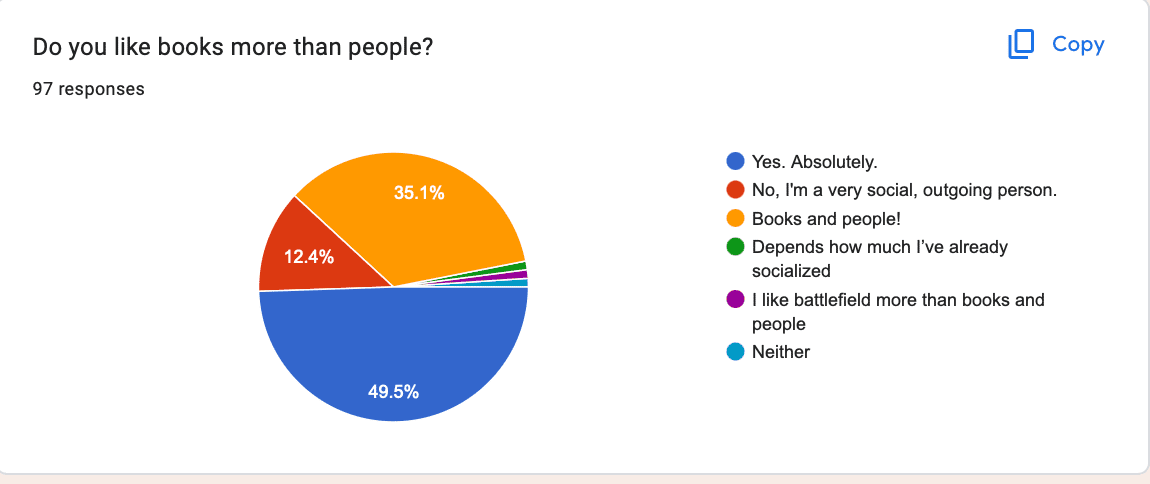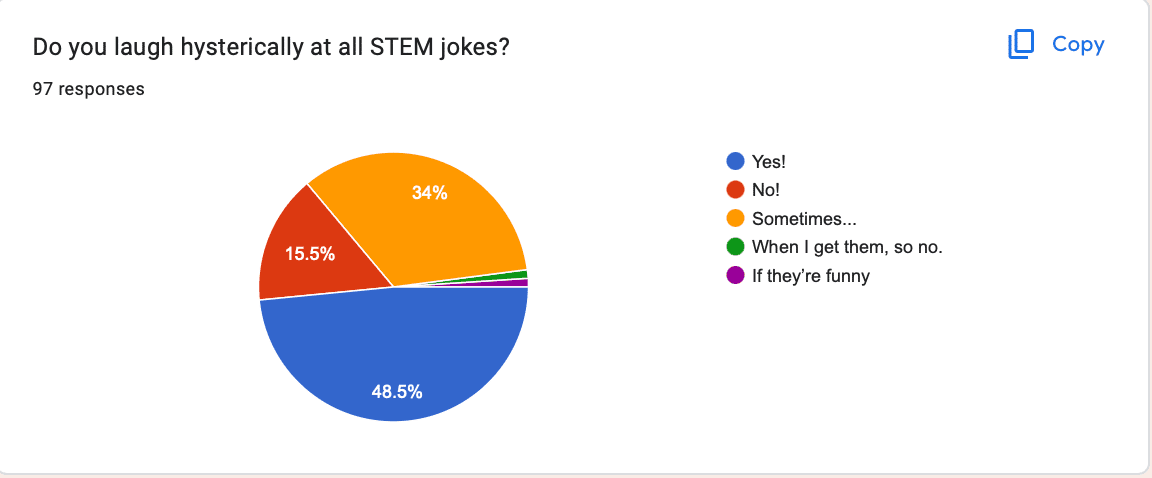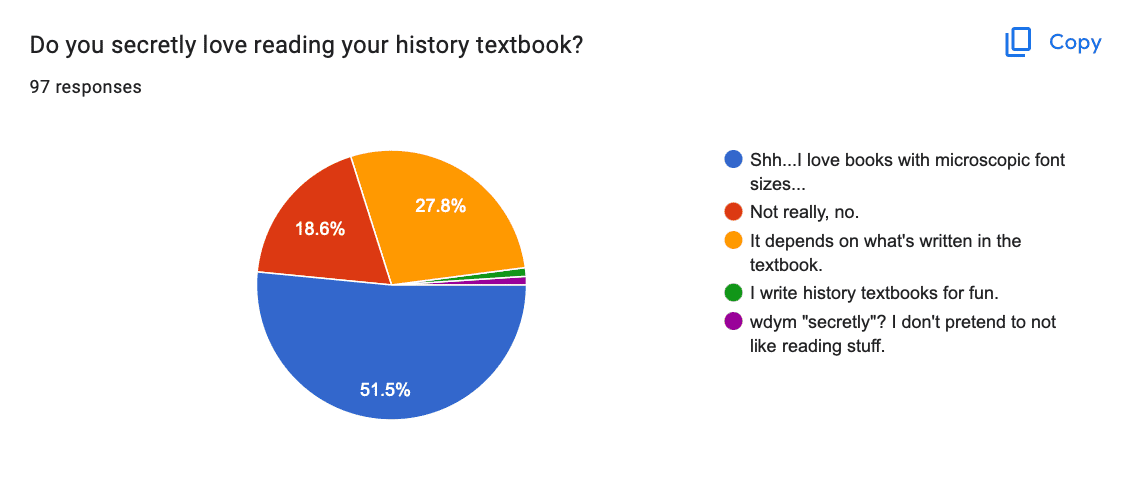If you are an aspiring member of your school's newspaper, but you're not exactly sure what to write about, don't worry! Your easy and simple guide to navigating the world of high school newspapers is here. Read on to find out more about a veteran's experience writing for her school's paper for three years of high school.
1. Fun research paper!
For journalistic papers, think of a question you've always wanted to answer about your school and keep the scale appropriately small and answerable so that your piece has a clear point. You can, obviously, write about current events or a Taylor Swift concert you went to last week, but if you want to write an article directly for your classmates, make sure their opinions are included! Send our Google forms to the whole school, and conduct interviews—this is one of the best ways to prepare for becoming a true journalist!
2. Write about school-relevant topics.
This might mean sending out a survey to your entire school, as I did my freshman year—scary, but helpful. For my first article, my topic was “Conundrum: Mathletes vs. Athletes” as a silly joke on how most students at my school are STEM kids—we don't have many of the typical jocks. However, my first question was more about the general “nerd” side of things.

Hilariously enough, my “nerd” hypothesis was correct—nearly 50% of students (we only have about 140 students in total, so 97 responses is a pretty good representation) like reading more than people. I would have to put myself in the books and people category, as books can sometimes get a little boring (as can people).
Some of my favorite responses ended up being “I like battlefield more than books and people,” and I already have several good lists of suspects. Some students are way more likely than others to prefer video games.
Provocative? A little. Intriguing?
Absolutely. If I had asked students questions about school food or favorite classes, basic questions on the school itself, I think this piece would have stood out just a little less. School-related questions do not have to be about the actual school—because my school is known for being nerdy, I asked students personal questions about themselves, as I wasn't sure questions like “Do you think everyone here is a nerd” would be the best kind of questions to ask. My next question was also personal, rather than about the school:

I can imagine the same 49% of students who love reading more than people answered “Yes!” here as well. Some people felt a bit more snarky about this question—"When I get them, so no"—so I had to wonder whether students had a bad experience with science teacher puns in the middle of AP review. Again, it related to school, but never explicitly mentioned it.
3. Ask provocative questions.

4. Personal favorites:
- “Wdym secretly? I don't pretend to not like reading stuff.” Love them for that!
- “I write history textbooks for fun.” To this day, I have no idea who could have said this, but I want to meet them.
5. Ask open-ended questions, too!

So much variety. Took quite a while to get through everything, but worth it! I'm still confused by “Beat Saber,” as I've been a member of my school's saber fencing team since freshman year, so perhaps they meant that they wanted to beat the saber team?
The nearly 50% “Mathletes Unite!” was hilarious to me, as the school requires that every student do a sport every other day of the school week, so I can imagine how many students dreaded going to sports every day, as they would rather be doing…math. Hey, to each their own!
“Stick fighting” was a bit of a concerning answer, along with “professional rock, paper, scissors.” I did appreciate the mention of quidditch and wholeheartedly agree. My life has never been the same since I read Harry Potter! (By the way, I'm a Ravenclaw—comment your house!)
6. Ask lots of questions…but get to the point.
You want to be sure that the audience knows the point—just ask your research question directly.

A whopping 71%—I love the blatant honesty. In my freshman year, I probably wouldn't have been so sure if I was a nerd or not.
Now, I know that I was just lying to myself—while I may not be a science nerd, I am totally a writing nerd! I give my greatest thank you to all participants who honestly answered this question, as “nerd” often has a negative connotation—the effects of which I explored through my survey comments.
7. Encourage feedback from participants.
At the end of your survey, put a “Comments and/or Concern?” question. Trust me, most of my paper focused on the lengthy responses at the end as they conveyed much more than the multiple-choice ever could.
Some highlights:
“It's a nerd school. For nerds.” I have to say I mostly agree!
“No time to read anymore." This comment stuck with me. Over the summer, I'm usually able to read and read until my eyes become practically cross-eyed, but during the school year, nada zilch zip!
“You should have used an NFC chip to distribute this survey.” I had to search up what an NFC chip was after seeing this comment, and I have to say, I'm still confused. This was a comment so very likely from a science nerd—they are a whole galaxy away, unfortunately.
8. Accept feedback from peers and teachers.
After spending hours collecting data and then analyzing and writing it all out, you may feel like you don't need to spend any more time editing your piece—you don't deserve to be stuck at your desk, reading your writing over and over again until you just want to throw the piece in the virtual garbage. Maybe you even throw the piece in the garbage or delete all the words from the Google Doc and slam your computer shut.
This is my call to tell you to come back now before later. You have put so much work into this piece—if your editors want you to make some changes, they simply want to make it famous! No writer or journalist has ever gotten famous without constructive critiques—few writers even pick their own titles!
Editors are your best friend after you've finished writing—often, they've been at the paper longer than you have and know exactly what the school public wants to read. Take advantage of their helpfulness by asking questions before and after you write the piece, whether it be about the topic or idea, or even simple writing help. They can also help you format the piece and inform you of important logistics, such as word count. I would highly recommend never going over 1.5k words as the attention span of a high school student is probably less than that of a goldfish.
Overall, writing a piece for the school paper doesn't have to be stressful—with consistent communication with editors and students, you can make your piece appeal to all students and make your whole school's newspaper truly shine!




